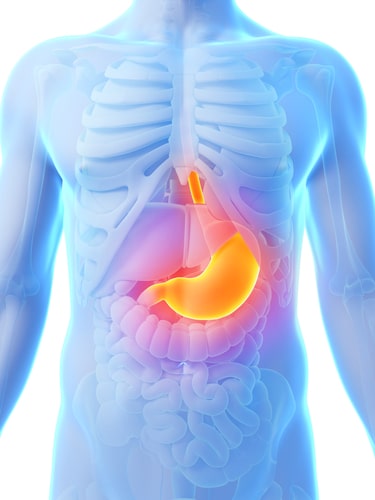
What goes on in the brain affects the stomach and vice versa. The vagus nerve extends from the brain stem to the abdomen, and about 90 percent of its nerve fibers direct information to the brain, but not away from it.
This means that what goes on in your gut has a strong influence on what is happening in your brain. It contains 100 million neurons and uses more than 30 neurotransmitters. No wonder it’s referred to as the “second brain”.
The health of your digestive system is directly related to the health of your brain. Achieving optimum digestive health is vital if you struggle with depression and anxiety.
The Gut-Brain Connection: Rebuild Healthy Gut Flora
An abundance of gut flora is crucial for healthy digestion and a strong immune system. These beneficial bacteria outnumber your body’s cells 10 to one. They are the overseers of the gut, maintaining and directing the cells that form the protective lining of your intestinal tract. This lining keeps food and pathogens from escaping into your bloodstream.
When your beneficial bacteria–also called probiotics–become depleted, the protective lining begins to develop holes. This is caused by a variety of factors, including diet, stress, and environmental toxins.
This condition is called leaky gut. It paves the way for food particles and pathogens to escape into the bloodstream. This can lead to an assortment of problems, including mood disorders, migraines, autoimmunity, and digestive issues.
Taking a probiotic supplement and adding fermented foods to your diet, like sauerkraut or pickles, helps rebuild beneficial bacteria. When healthy flora is replenished, holes seal up and disorders diminish. The Gut and Physiology Syndrome (GAPS) diet is an ideal way to build up gut flora and reverse your symptoms.
The Gut-Brain Connection: Check for Food Sensitivities and Allergies
Those who have undiagnosed celiac disease often struggle with depression. Most doctors fail to recognize the connection between celiac and mood disorders. Celiac sufferers often remain undiagnosed for years.
Digestive problems are common with those who have celiac disease or gluten sensitivity, so they are often misdiagnosed as having irritable bowel syndrome (IBS). They aren’t placed on a gluten-free diet, so the symptoms continue.
Other foods may produce problems with digestion as well. The most common foods that cause adverse reactions include legumes, dairy, nuts, and even the nightshade vegetables (tomatoes, potatoes, eggplant, and peppers). In order to determine which foods may be causing a reaction, keep a food diary and take note of your symptoms, including changes in mood, energy, and digestive health.
The Gut-Brain Connection: Eat More Natural Fats and Oily Fish
The digestive system has its own nervous system that contains as many neurons as the spinal cord. Neurons are nerve cells that transfer information. They are protected by myelin, which is composed of 70 percent fat and 30 percent protein. These nutrients are essential for proper nerve function.
The human brain is made up mostly of fat. Much of this fat is in the form of DHA omega-3 and arachidonic acid (AA). Oily ocean fish, like salmon, tuna, and sardines, are the best sources of DHA. Studies show that those who eat seafood at least twice each week suffer less depression on average than others.
Meat, eggs, and dairy contain AA. People who struggle with chronic depression tend to have low levels of omega-6 fatty acid. A lack of AA in the diet can make depression worse.
Healthy brain function is impossible if you don’t have a healthy digestive tract. Restore your beneficial bacteria, determine if you have any food allergies or sensitivities, and include natural fats in your diet in order to stabilize your mood. For relief from your depression and anxiety, don’t forget to take care of your “second brain” as well as your first.
Resources:
Hadhazy, Adam. “How the Gut’s “Second Brain” Influences Mood and Well-Being.” Scientific American. Scientific American, 12 Feb. 2010. Web. 03 Feb. 2012.
Smith, D. F., and Gerdes, L. U. (2011), Meta-analysis on anxiety and depression in adult celiac disease. Acta Psychiatrica Scandinavica. doi: 10.1111/j.1600-0447.2011.01795.x
Drago, Sandro, Ramzi El Asmar, Mariarosaria Di Pierro, et al. “Gliadin, Zonulin, and Gut Permeability: Effects on Celiac and Non-celiac Intestinal Mucosa and Intestinal Cell Lines.” Scandinavian Journal of Gastroenterology 41.4 (2006): 408-19. Print.
Korkut, Esin, Mehmet Bektas, Erkin Oztas, Mevlut Kurt, Hulya Cetinkaya, and Ali Ozden. “The Prevalence of Celiac Disease in Patients Fulfilling Rome III Criteria for Irritable Bowel Syndrome.” European Journal of Internal Medicine 21.5 (2010): 389-92. Print.
Noaghiul, S. “Cross-National Comparisons of Seafood Consumption and Rates of Bipolar Disorders.” American Journal of Psychiatry 160.12 (2003): 2222-227.
Bowen, R. “The Enteric Nervous System.” Colorado State, 2006. Web. 25 July 2012.
Related Articles By Cathe:
New Evidence That a Wheat-Free and Gluten-Free Diet Is Beneficial
3 Ways Dietary Lectins Can Cause Obesity, Autoimmune Disease, and Depression

